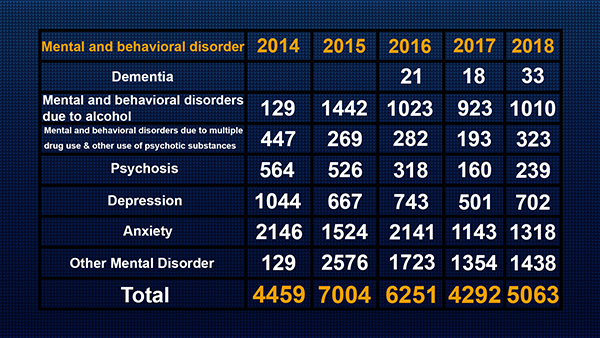 The health ministry recorded about 5000 mental and behavioural disorders last year. This is an increase of almost 800 compared to about 4200 hundred in 2017. A mental disorder is a behavioural or mental pattern that causes significant distress or impairment of personal functioning. Mental disorders are usually defined by a combination of how a person behaves, feels, perceives or thinks.
The health ministry recorded about 5000 mental and behavioural disorders last year. This is an increase of almost 800 compared to about 4200 hundred in 2017. A mental disorder is a behavioural or mental pattern that causes significant distress or impairment of personal functioning. Mental disorders are usually defined by a combination of how a person behaves, feels, perceives or thinks.
According to the bulletin, mental and behavioural disorders due to alcohol, multiple drug use and psychoactive substances, psychosis, depression and anxiety increased by a huge number compared to 2017.
Dr Chencho, a psychiatrist with the National Referral Hospital said the increasing trend of the mental health disorders signifies two things.
“If the cases are increasing, it means that more people are actually seeking help from the health centres. So it actually reflects the health-seeking behaviour of patients, so they come to the hospital, seek treatment and we have more numbers. The other issue can be because the actual cases of mental disorders in the country are increasing. So you have to interpret in two ways, either it is the behavioural change or the health-seeking behaviour or the actual number of cases is increasing.”
While the bulletin gives a total number of people having mental health challenges, Dr Chencho added that the actual number of Bhutanese could be much higher. People still hesitate to come for treatment and mental health problems continue to be a major health concern and treating it remains a challenge.
“The biggest challenge obviously is people actually not coming for help because they don’t know that they have a mental illness. If some of them do have there is still a lot of stigma about it. They feel ashamed. Families, neighbours and communities don’t actually easily accept mental illness as much as you would expect physical illness,” he added.
“Anxiety or depression or any of these mental disorders are much like other physical disorders we have. So long as have this mind and the body and all these complex structures in us, we can become depressed without any reason. We don’t have to find a reason to get depressed.”
Meanwhile, anxiety is the most common form of mental health problems prevalent in the country today. Anxiety is a disorder that causes a feeling of fear and worry.
“We also call it neurotic disorders. Neurosis is more like stress-related. You are confronting with the stress, a problem in your life or some situational problem or crisis situations and you are psychologically responding to it and also your body will automatically respond your mind whether you like it or not. So neurosis or anxiety-related disorders are the most common and there are many different types,” Dr Chencho Dorji said.
With the increasing cases of mental health problems, Bhutan is in urgent need for mental health services, education and awareness on the importance of mental health.
The health ministry has an approved budget of Nu 4.2 M for mental health interventions for this year. The intervention program will focus more on the capacity development of health professionals. Today, there are four psychiatrists in the country.









